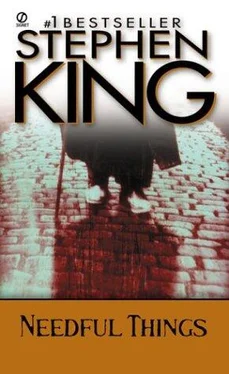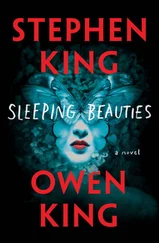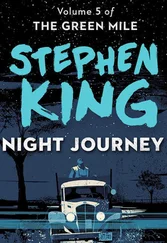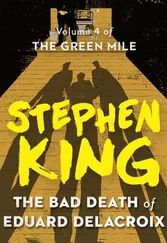Stephen King - Needful Things
Здесь есть возможность читать онлайн «Stephen King - Needful Things» весь текст электронной книги совершенно бесплатно (целиком полную версию без сокращений). В некоторых случаях можно слушать аудио, скачать через торрент в формате fb2 и присутствует краткое содержание. Год выпуска: 1991, Жанр: Ужасы и Мистика, на английском языке. Описание произведения, (предисловие) а так же отзывы посетителей доступны на портале библиотеки ЛибКат.
- Название:Needful Things
- Автор:
- Жанр:
- Год:1991
- ISBN:нет данных
- Рейтинг книги:4 / 5. Голосов: 1
-
Избранное:Добавить в избранное
- Отзывы:
-
Ваша оценка:
- 80
- 1
- 2
- 3
- 4
- 5
Needful Things: краткое содержание, описание и аннотация
Предлагаем к чтению аннотацию, описание, краткое содержание или предисловие (зависит от того, что написал сам автор книги «Needful Things»). Если вы не нашли необходимую информацию о книге — напишите в комментариях, мы постараемся отыскать её.
Needful Things — читать онлайн бесплатно полную книгу (весь текст) целиком
Ниже представлен текст книги, разбитый по страницам. Система сохранения места последней прочитанной страницы, позволяет с удобством читать онлайн бесплатно книгу «Needful Things», без необходимости каждый раз заново искать на чём Вы остановились. Поставьте закладку, и сможете в любой момент перейти на страницу, на которой закончили чтение.
Интервал:
Закладка:
“Any fresh outbursts from Buster or the Reverend Willie?” she asked sleepily.
Alan smiled. “Quiet on both fronts, at least for the time being.
I appreciate Mr. Keeton and Reverend Rose the most when I see them the least, and by that standard today was great.”
“That’s good,” she murmured.
“Yeah, but I know something even better.”
“What?”
“Norris is back in a good mood. He bought a rod and reel from your friend Mr. Gaunt, and all he can talk about is going fishing this weekend. I think he’ll freeze his butt off-what little butt he has-but if Norris is happy, I’m happy. I was sorry as hell when Keeton rained on his parade yesterday. People make fun of Norris because he’s skinny and sort of ditzy, but he’s developed into a pretty good small-town peace officer over the past three years. And his feelings are as sensitive as anyone else’s. It’s not his fault that he looks like Don Knotts’s half-brother.”
“Ummmmm…”
Drifting. Drifting into some sweet darkness where there was no pain. Polly let herself go, and as sleep took her there was a small and catlike expression of satisfaction on her face.
7
For Alan, sleep was longer coming.
The interior voice had returned, but its tone of false glee was gone. Now it sounded questioning, plaintive, almost lost. Where are we, Alan? it asked. Isn’t this the wrong room? The wrong bed? The wrong woman? I don’t seem to understand anything anymore.
Alan suddenly found himself feeling pity for that voice. It was not self-pity, because the voice had never seemed so unlike his own as it did now. It occurred to him that the voice wanted to speak as little as he the rest of him, the Alan existing in the present and the Alan planning for the future-wanted to hear it. It was the voice of duty, the voice of grief. And it was still the voice of guilt.
A little over two years ago, Annie Pangborn had begun having headaches. They weren’t bad, or so she said; she was as loath to talk about them as Polly was to talk about her arthritis. Then, one day when he was shaving-very early in 1990, that must have been-Alan noticed that the cap had been left off the family-size bottle of Anacin 3 standing beside the bathroom sink. He started to put the cap back on… then stopped. He had taken a couple of aspirin from that bottle, which held two hundred and twenty-five caplets, late the week before.
It had been almost full then. Now it was almost empty. He had wiped the remains of shaving cream from his face and gone down to You Sew and Sew, where Annie had worked since Polly Chalmers opened. He took his wife out for coffee… and a few questions. He asked her about the aspirin. He remembered being a little frightened.
(only a little, the interior voice agreed mournfully) but only a little, because nobody takes a hundred and ninety aspirin caplets in a single week; nobody. Annie told him he was being silly. She had been wiping the counter beside the sink, she said, and had knocked the bottle over. The top hadn’t been on tight, and most of the caplets had poured into the sink. They’d started to melt, and she’d thrown them away.
She said.
But he was a cop, and even when he was off-duty he could not put away the automatic habits of observation which came with the territory.
He could not turn off the lie detector. If you watched people when they answered the questions you asked, really watched them, you almost always knew when they were lying. Alan had once questioned a man who signalled every lie he told by picking at his eyetooth with his thumbnail. The mouth articulated the lies; the body, it seemed, was doomed to signal the truth. So he had stretched his hand across the table of the booth in Nan’s where they had been sitting, had grasped Annie’s hands in his own, and had asked her to tell the truth. And when, after a moment’s hesitation, she told him that, yes, the headaches were a little worse, and yes, she had been taking quite a few aspirin, but no, she hadn’t taken all the caplets which were missing, that the bottle really had spilled in the sink, he had believed her.
He had fallen for the oldest trick in the book, the one con-men called bait-and-switch: if you tell a lie and get caught, back up and tell half the truth. If he had watched her more closely, he would have known Annie still wasn’t being straight with him. He would have forced her to admit something which seemed nearly impossible to him, but which he now believed to be the truth: that the headaches were bad enough for her to be taking at least twenty aspirin a day. And if she had admitted that, he would have had her in a Portland or Boston neurologist’s office before the week was out. But she was his wife, and in those days he had been less observant when he was off-duty.
He had contented himself with making an appointment for her with Ray Van Allen, and she had kept the appointment. Ray had found nothing, and Alan had never held that against him. Ray had run through the usual reflex tests, had looked into her eyes with his trusty ophthalmoscope, had tested her vision to see if there was any doubling, and had sent her to Oxford Regional for an X-ray.
He had not, however, ordered a CAT scan, and when Annie said the headaches were gone, Ray had believed her. Alan suspected he might have been right to believe her. He knew that doctors are almost as attuned to the body’s language of lies as cops. Patients are almost as apt to lie as suspects, and from the same motive: simple fear. And when Ray saw Annie, he had not been off-duty.
So maybe, between the time Alan had made his discovery and the time Annie went to see Dr. Van Allen, the headaches had gone away. Probably they had gone away. Ray had told Alan later, in a long conversation over glasses of brandy at the doctor’s Castle View home, that the symptoms often came and went in cases where the tumor was located high on the stem of the brain. “Seizures are often associated with stem tumors,” he told Alan. “If she’d had a seizure, maybe -…” And he had shrugged. Yes. Maybe. And maybe a man named Thad Beaumont was an unindicted co-conspirator in the deaths of his wife and son, but Alan could not find blame in his heart for Thad, either.
Not all the things which happen in small towns are known to the residents, no matter how sharp their ears are or how energetically their tongues wag. In Castle Rock they knew about Frank Dodd, the cop who went crazy and killed the women back in Sheriff Bannerman’s day, and they knew about Cujo, the Saint Bernard who had gone rabid out on Town Road #3, and they knew that the lakeside home of Thad Beaumont, novelist and local Famous Person, had burned to the ground during the summer of 1989, but they did not know the circumstances of that burning, or that Beaumont had been haunted by a man who was really not a man at all, but a creature for which there may be no name. Alan Pangborn knew these things, however, and they still haunted his sleep from time to time. All that was over by the time Alan became fully aware of Annie’s headaches… except it really wasn’t over. By virtue of Thad’s drunken phonecalls, Alan had become an unwilling witness to the crash of Thad’s marriage and the steady erosion of the man’s sanity. And there was the matter of his own sanity, as well. Alan had read an article in some doctor’s office about black holes-great celestial empty places that seemed to be whirlpools of anti-matter, voraciously sucking up everything within their reach. In the late summer and fall of 1989, the Beaumont affair had become Alan’s own personal black hole. There were days when he found himself questioning the most elementary concepts of reality, and wondering if any of it had actually happened. There were nights when he lay awake until dawn stained the east, afraid to go to sleep, afraid the dream would come: a black Toronado bearing down on him, a black Toronado with a decaying monster behind the wheel and a sticker reading HIGH-TONED SON OF A BITCH on the rear bumper. In those days, the sight of a single sparrow perched on the porch railing or hopping about on the lawn had made him feel like screaming.
Читать дальшеИнтервал:
Закладка:
Похожие книги на «Needful Things»
Представляем Вашему вниманию похожие книги на «Needful Things» списком для выбора. Мы отобрали схожую по названию и смыслу литературу в надежде предоставить читателям больше вариантов отыскать новые, интересные, ещё непрочитанные произведения.
Обсуждение, отзывы о книге «Needful Things» и просто собственные мнения читателей. Оставьте ваши комментарии, напишите, что Вы думаете о произведении, его смысле или главных героях. Укажите что конкретно понравилось, а что нет, и почему Вы так считаете.











